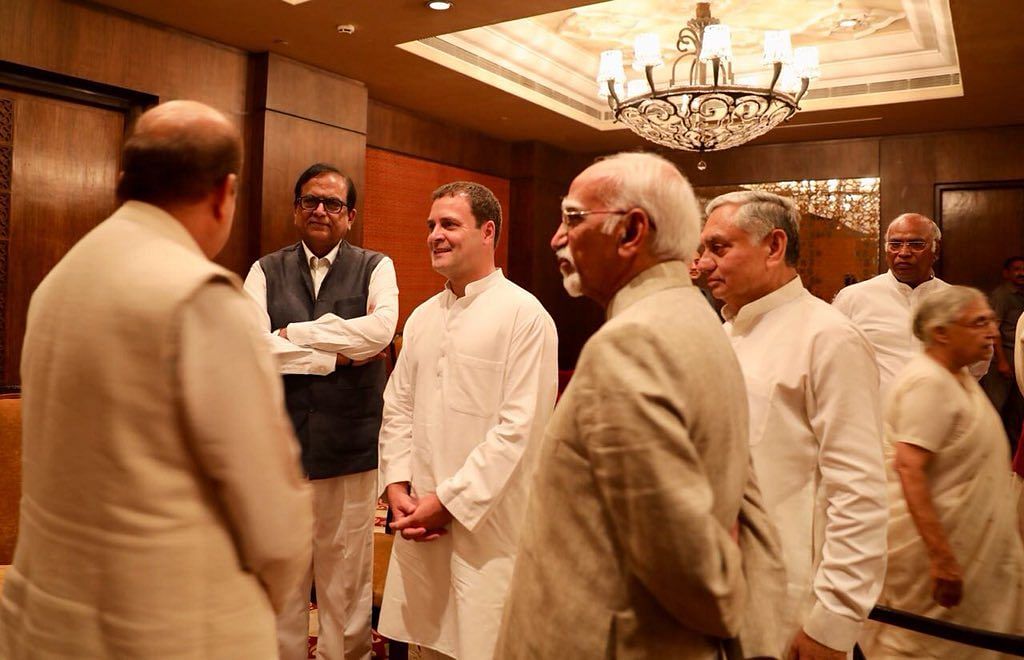Pranab Mukherjee’s presence and prominence ran contrary to Rahul Gandhi’s iftar attempt as a goodwill gesture towards Muslims.
Rahul Gandhi’s hurriedly organised iftar was a near disaster. The number of genuine rozedars – who observe the fast – was, in fact, few. Invites were restricted and given in pecking order of hierarchy and status, contrary to the true spirit of Ramzan and Islamic concept of egalitarianism.
In the absence of Sonia Gandhi (who is still abroad), the much-touted show of opposition unity was missing. Both Mayawati and Akhilesh Yadav were conspicuous by their absence. Rahul seemed more indulgent towards Pranab Mukherjee.
The Congress veterans say Mukherjee has already played his cards by going to Nagpur, and is now no longer politically useful for the party. The minority wing of the AICC has slipped in giving Rahul an important feedback that the former president’s image among Muslims has taken a severe beating following his Nagpur adventure. For many Muslims, the description of K.B. Hedgewar as a great son of India and a commentary on the 600 years’ rule by ‘Muslim invaders’ has put Mukherjee in league of P.V. Narasimha Rao.
In a nutshell, Mukherjee’s presence and prominence ran contrary to Rahul’s iftar attempt as a goodwill gesture towards Muslims.
Opposition no-show
The other unstated goal of Rahul’s iftar was to showcase opposition unity. That too remained unfulfilled.
Although Bahujan Samaj Party (BSP) chief Mayawati sent her high-level emissary in the form of Satish Mishra, there was no senior leader from the Samajwadi Party (SP), not even Ram Gopal Yadav. Is the SP cold to the idea of the Congress eyeing a slice of pie in Uttar Pradesh, where a grand anti-BJP alliance is being worked out among the SP-BSP and the Rashtriya Lok Dal (RLD)?
Political grapevine has it that “Uttar Pradesh ke ladke” have had a bitter parting since February 2017 when political strategist Prashant Kishor had played a go-between. Were the post-poll Indian Political Action Committee (I-PAC) invoice(s) responsible for the bad blood between “Uttar Pradesh ke ladke?”
The much-hyped opposition unity at this stage is a mirage. The real test of unity among opposition will come in early December when the state assembly poll results of Madhya Pradesh, Chhattisgarh and Rajasthan will be declared. If the Congress gains in these three BJP-ruled states, as predicted by some pollsters, Rahul-led Congress will get a boost. The ensuing euphoria and the sense of ‘we have arrived vis-a- vis BJP’ have every potential of putting off non-NDA parties like the BSP, the Trinamool Congress (TMC), the SP, and other Third Front protagonists.
It is an open secret that the Third Front leaders are hoping for a weak Congress to repeat 1996 United Front experience in May 2019. It may be exceptionally wishful, but the SP, the BSP and the TMC have no desire to fulfil the Congress’ ambition to take the centre stage of national politics. An iftar over khajoor and sherbet, followed by biryani and kebab, have little or no potential to gloss over personal ambition and one-upmanship.
The five-star culture
Post-iftar, the skewed guest list, rather non-inclusion of community leaders, became a big talking point within the Muslim community. Some Urdu newspaper editors asked why the party had only invited those considered close. After all, when iftars were held at the Rashtrapati Bhavan, or Hyderabad House, and even at 24 Akbar Road, great care used to be taken to identify an assortment of community leaders, scholars, intellectuals and clergy from across the length and breadth of the country.
At the Taj Palace iftar, even representation from Delhi’s Jama Masjid and Fatehpuri was missing. Credible leaders of the Muslim clergy had, in any case, passed an informal fatwa against political iftars, dubbing it as against the true spirit of Ramzan and Islam.
The Congress’ choice of a five-star hotel is interesting. There is a time-tested Congress convention to avoid “five-star culture.” In fact, when Abhishek Bachchan debuted in the 2000 film Refugee, an invitation was sent to Sonia Gandhi. But it was politely communicated that the Congress president does not visit ‘extravagant’ five-star hotels because the party philosophy revolved around simple living and high thinking.
Rasheed Kidwai is an Observer Research Foundation visiting fellow, author and journalist. the views expressed here are his own
